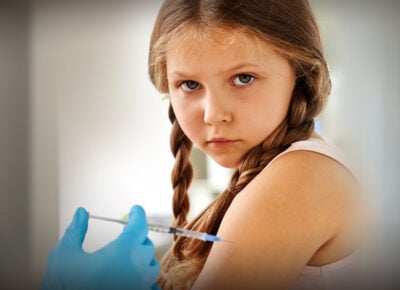Vaccine Safety & Children with Autism (Part 1)

Is the vaccine safe for children? Do vaccines cause autism in Children? What dilemma and challenge do the parents with autistic children face on the Covid-19 vaccine?

Autism on the Rise

According to the statistics from 2016 in the US, in the last 20 years, the incidence of autism has increased 20 times. There are nearly 3-4 children out of 100 diagnosed with autism.
Misperceptions and Suspicions About Vaccines Linking to Autism
In 1998, a doctor from England named Andrew Wakefield published an article in The Lancet with 11 other doctors regarding the possibility that MMR vaccines could cause autism. He suggested using a separate form of the vaccine to avoid the problem. The article generated a lot of attention and concerns worldwide and caused vaccine hesitancy and refusal among parents.

Reporters started to investigate the issue and the doctor’s background and research funding. They discovered that the doctor’s research funding came from a law firm specializing in cases against vaccine manufacturers and representing parents with autistic kids. The doctor’s motive was questioned, his article was eventually removed, and the British Medical Association revoked his medical license.
Scientists Ruled Out Vaccines As a Cause of Autism
Many doctors have done the same research and observation. They concluded that there is no evidence to prove vaccines are causing autism.
Press Release from CDC’s Immunization Safety Office also stated that numerous studies had found no association between childhood vaccination and the incidence of ASD,
However, misperceptions and suspicions persist. So was the vaccine hesitancy among parents.
Thimerosal in Vaccines and Autism
Thimerosal is a form of mercury used as a preservative in the United States in multi-dose vials (vials containing more than one dose) of medicines and vaccines.
Because some doctors hypothesized that the symptoms of autism mimic mercury intoxication, the public began to associate autism with vaccines again.
More researchers have found no evidence of harm caused by the low doses of thimerosal in vaccines. However, in July 1999, the Public Health Service agencies, the American Academy of Pediatrics, and vaccine manufacturers agreed that thimerosal should be reduced or eliminated in vaccines as a precautionary measure.
The prevalence of autism has not changed since the elimination and reduction of thimerosal from vaccines.
Why Do Some Communities Have Fewer Cases of Autism?
There are 45 states and Washington D.C. that grant religious exemptions for people who have religious objections to immunizations.
The incidence of autism is found relatively low in some communities that refuse to vaccinate their children due to their religious beliefs.

One explanation is that good religions teach people to be grateful, truthful, compassionate, kind, and tolerant. People believe in God and its superhuman power and communicate with God through prayer when they are not in control. Faith brings them spiritual strength and inner peace and tranquility. And their frequent praying and sharing makes them feel connected and supported and give them a strong sense of belonging. It makes them mentally healthier.
Another explanation is that parents in those communities live a relatively healthier lifestyle. They spend less time on screens and enjoy more family activities. They are less likely than others to drink alcohol or smoke overly. A healthier lifestyle helps create and raise healthier children.
What Role Does Genetics Play in Developing Autism
What are the similar personality traits of parents of autistic children?
Research has found that autistic parents usually have similar personality traits, such as introverted personality, stubbornness and rigidness, perfectionist, motivation for outstanding achievement, competitiveness, and attention to detail.
Parents of children with autism are likely to be in the following professions: accountant, lawyer, doctor, pharmacist, dentist, and computer engineer.
Genetic factors often influence these personality traits. The next generation of couples with those similar personalities will usually have more significant genetic issues.
Environmental Factors Contribute to Autism
Environmental issues also increase the risks of autism.
- Parents who passed the peak productive age;
- Mothers exposed to air and chemical pollution during pregnancy, like pesticides;
- Mothers suffering from malnutrition, diabetes, obesity, and immune diseases;
- Babies born prematurely;
- Oxygen deficiency caused by Obstructed labor
The Dilemma and Challenge
According to the epigenetic theory, not all defective genes cause harm to us. Our bodies’ mechanisms, such as methylation, can control the expression of defective genes.
However, 98% of patients with autism are characterized by undermethylation. In other words, it has weakened control over the expression of the defective genes, and any kind of peroxidative stress caused by external factors will lead to the expression of defective genes.
If not vaccinated, children genetically predisposed to autism could develop autism due to viral and bacterial infections.
On the other hand, since vaccines use deactivated or dead viruses and bacteria to stimulate our immune system to produce antibodies, it may cause oxidative stress to our body, and consequently, trigger defective gene expression that may increase the risk of autism.
We Can Still Help Autistic Children
Understanding the epigenetic nature of autism opens doors and windows to new therapies that can help regulate the genetic expression and improve the physical and mental functions of autistic children.
Get Help at the Yang Institute
If you have children who have autism, you may consider an integrative medicine approach.
Yang Institute treats autism and undermethylation with holistic and integrative medicine approach that combines Advanced Nutrient Therapy with Neurofeedback , and Neuromodulation Therapy.